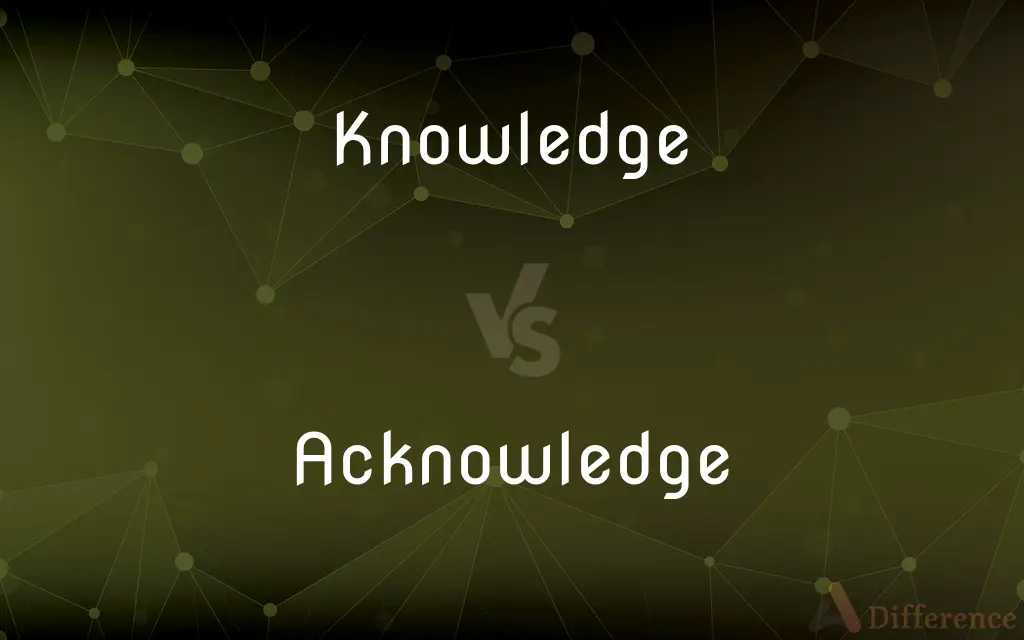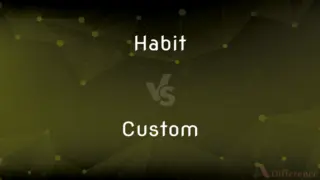Knowledge vs. Acknowledge — What's the Difference?
Edited by Tayyaba Rehman — By Fiza Rafique — Updated on April 27, 2024
Knowledge is the understanding or information gained through experience or education, while acknowledge involves accepting or admitting the truth or existence of something.

Difference Between Knowledge and Acknowledge
Table of Contents
ADVERTISEMENT
Key Differences
Knowledge encompasses the facts, information, and skills acquired through experience or education. It represents a deeper comprehension and familiarity with various subjects or environments. On the other hand, acknowledge generally refers to the act of recognizing the truth or existence of something, often involving a conscious declaration or acceptance of a fact or situation.
Knowledge is often cumulative, building upon what one learns over time, contributing to one’s intellectual or practical capability. Whereas acknowledge is typically a momentary recognition that does not necessarily affect one's depth of understanding but confirms the existence or validity of a particular fact or idea.
Gaining knowledge can be a proactive process that involves learning, researching, and educating oneself to understand a concept thoroughly. Conversely, to acknowledge something can be reactive, such as acknowledging someone’s contribution or the validity of an argument only after it is presented.
Knowledge can be theoretical or practical, often requiring validation and evidence, and is usually shared or taught through educational systems. On the other hand, acknowledge is more about personal or public acceptance, and it can often be expressed informally or formally, like in acknowledgments in a book or speech.
The value of knowledge lies in empowerment and the ability to make informed decisions. Whereas the act of acknowledging can play a crucial role in communication and social interactions, as it can validate or recognize the importance of others or the truth.
ADVERTISEMENT
Comparison Chart
Definition
Information and skills acquired through experience or education.
Recognition of the truth or existence of something.
Process
Cumulative and proactive learning.
Momentary and often reactive.
Usage
Can be theoretical or practical.
More about acceptance or declaration.
Purpose
Empowers and aids in decision-making.
Validates or recognizes facts or contributions.
Expression
Shared through education and discourse.
Expressed informally or formally.
Compare with Definitions
Knowledge
Accumulated data and facts.
The scientist’s knowledge was crucial to the experiment's success.
Acknowledge
To express gratitude or obligation.
The author acknowledged his mentor in the book’s foreword.
Knowledge
Information possessed about a subject.
His knowledge of programming made him an excellent candidate.
Acknowledge
To admit the existence or legality of something.
The company acknowledged the warranty claims of customers.
Knowledge
Awareness or familiarity gained by experience.
Through trial and error, her knowledge of the software improved.
Acknowledge
To accept the truth or recognize the presence of.
He acknowledged the difficulty of the task ahead.
Knowledge
Theoretical or practical understanding.
Practical knowledge is often gained through hands-on experience.
Acknowledge
To show that one has noticed or recognized.
She acknowledged her colleague’s help with a thank you note.
Knowledge
Understanding gained through learning.
Her knowledge of history was vast due to her extensive reading.
Acknowledge
To recognize the importance or quality of.
The teacher acknowledged the student’s improvement.
Knowledge
Knowledge is a familiarity, awareness, or understanding of someone or something, such as facts (descriptive knowledge), skills (procedural knowledge), or objects (acquaintance knowledge). By most accounts, knowledge can be acquired in many different ways and from many sources, including but not limited to perception, reason, memory, testimony, scientific inquiry, education, and practice.
Acknowledge
Accept or admit the existence or truth of
The plight of the refugees was acknowledged by the authorities
The government acknowledged that the tax was unfair
‘That's true,’ she acknowledged
Knowledge
Facts, information, and skills acquired through experience or education; the theoretical or practical understanding of a subject
A thirst for knowledge
Her considerable knowledge of antiques
Acknowledge
Recognize the importance or quality of
The hotel is widely acknowledged as one of Cornwall's finest
The art world has begun to acknowledge his genius
Knowledge
Awareness or familiarity gained by experience of a fact or situation
The programme had been developed without his knowledge
He denied all knowledge of the incidents
Acknowledge
Show that one has noticed or recognized (someone) by making a gesture or greeting
She refused to acknowledge my presence
Knowledge
The state or fact of knowing
Humans naturally aspire to knowledge.
Acknowledge
To admit the existence or truth of
The doctors acknowledged that the treatment had not been successful.
Knowledge
Familiarity, awareness, or understanding gained through experience or study
Has great knowledge of these parts.
Has only limited knowledge of chemistry.
Acknowledge
To express recognition of; make notice of
"When he saw me acknowledge him, he smiled as if we were dear friends" (Angela Patrinos).
Knowledge
The sum or range of what has been perceived, discovered, or learned
The extraordinary knowledge housed in the library.
Acknowledge
To express gratitude or appreciation for or to
Acknowledged the contributions of the volunteers.
Acknowledged her editor in the preface to the book.
Knowledge
(Archaic) Carnal knowledge.
Acknowledge
To report the receipt of (something) to the sender or giver
Acknowledge a letter.
Knowledge
The fact of knowing about something; general understanding or familiarity with a subject, place, situation etc.
His knowledge of Iceland was limited to what he'd seen on the Travel Channel.
Acknowledge
(Law) To accept or certify as legally binding
Acknowledge a deed of ownership.
Knowledge
Awareness of a particular fact or situation; a state of having been informed or made aware of something.
Acknowledge
(transitive) To admit the knowledge of; to recognize as a fact or truth; to declare one's belief in
To acknowledge the being of a god
Knowledge
Intellectual understanding; the state of appreciating truth or information.
Knowledge consists in recognizing the difference between good and bad decisions.
Acknowledge
(transitive) To own or recognize in a particular quality, character or relationship; to admit the claims or authority of; to give recognition to.
Knowledge
Familiarity or understanding of a particular skill, branch of learning etc.
Does your friend have any knowledge of hieroglyphs, perchance?
A secretary should have a good knowledge of shorthand.
Acknowledge
(transitive) To be grateful of (e.g. a benefit or a favour)
To acknowledge a favor
Knowledge
(philosophical) Justified true belief
Acknowledge
(transitive) To report (the receipt of a message to its sender).
This is to acknowledge your kind invitation to participate in the upcoming debate.
Knowledge
(obsolete) Information or intelligence about something; notice.
Acknowledge
(transitive) To own as genuine or valid; to assent to (a legal instrument) to give it validity; to avow or admit in legal form.
Knowledge
The total of what is known; all information and products of learning.
His library contained the accumulated knowledge of the Greeks and Romans.
Acknowledge
To own or admit the knowledge of; to recognize as a fact or truth; to declare one's belief in; as, to acknowledge the being of a God.
I acknowledge my transgressions.
For ends generally acknowledged to be good.
Knowledge
(countable) Something that can be known; a branch of learning; a piece of information; a science.
Acknowledge
To own or recognize in a particular character or relationship; to admit the claims or authority of; to give recognition to.
In all thy ways acknowledge Him.
By my soul, I'll ne'er acknowledge thee.
Knowledge
(obsolete) Acknowledgement.
Acknowledge
To own with gratitude or as a benefit or an obligation; as, to acknowledge a favor, the receipt of a letter.
They his gifts acknowledged none.
Knowledge
(obsolete) Notice, awareness.
Acknowledge
To own as genuine; to assent to, as a legal instrument, to give it validity; to avow or admit in legal form; as, to acknowledge a deed.
Knowledge
The deep familiarity with certain routes and places of interest required by taxicab drivers working in London, England.
Acknowledge
Declare to be true or admit the existence or reality or truth of;
He admitted his errors
She acknowledged that she might have forgotten
Knowledge
(obsolete) To confess as true; to acknowledge.
Acknowledge
Report the receipt of;
The program committee acknowledged the submission of the authors of the paper
Knowledge
The act or state of knowing; clear perception of fact, truth, or duty; certain apprehension; familiar cognizance; cognition.
Knowledge, which is the highest degree of the speculative faculties, consists in the perception of the truth of affirmative or negative propositions.
Acknowledge
Express recognition of the presence or existence of, or acquaintance with;
He never acknowledges his colleagues when they run into him in the hallway
She acknowledged his complement with a smile
It is important to acknowledge the work of others in one's own writing
Knowledge
That which is or may be known; the object of an act of knowing; a cognition; - chiefly used in the plural.
There is a great difference in the delivery of the mathematics, which are the most abstracted of knowledges.
Knowledges is a term in frequent use by Bacon, and, though now obsolete, should be revived, as without it we are compelled to borrow "cognitions" to express its import.
To use a word of Bacon's, now unfortunately obsolete, we must determine the relative value of knowledges.
Acknowledge
Express obligation, thanks, or gratitude for;
We must acknowledge the kindness she showed towards us
Knowledge
That which is gained and preserved by knowing; instruction; acquaintance; enlightenment; learning; scholarship; erudition.
Knowledge puffeth up, but charity edifieth.
Ignorance is the curse of God;Knowledge, the wing wherewith we fly to heaven.
Acknowledge
Accept as legally binding and valid;
Acknowledge the deed
Knowledge
That familiarity which is gained by actual experience; practical skill; as, a knowledge of life.
Shipmen that had knowledge of the sea.
Acknowledge
Accept (someone) to be what is claimed or accept his power and authority;
The Crown Prince was acknowledged as the true heir to the throne
We do not recognize your gods
Knowledge
To acknowledge.
Knowledge
The psychological result of perception and learning and reasoning
Common Curiosities
How does knowledge affect decision-making?
Knowledge empowers individuals by providing them with the necessary information to make informed decisions.
Is knowledge always based on education?
No, knowledge can also stem from personal experiences, observations, or self-teaching.
What differentiates knowledge from mere information?
Knowledge is information that has been understood and assimilated; it often involves comprehension and the ability to apply what one has learned.
What are the ethical implications of failing to acknowledge someone’s work or contribution?
Failing to acknowledge someone’s work can lead to ethical breaches such as plagiarism, reduced credibility, and can damage professional relationships.
What are common ways people acknowledge others?
Common ways include verbal recognition, written acknowledgments, and formal declarations.
How does acknowledging someone affect communication?
It enhances communication by showing respect and appreciation, which can foster better interactions.
Can knowledge be incorrect?
Yes, what one considers knowledge can be incorrect if it is based on faulty information or misconceptions.
What is the core of gaining knowledge?
The core of gaining knowledge is the accumulation of information through learning and experiences.
How can acknowledging personal mistakes impact personal growth?
Acknowledging personal mistakes is key to learning and self-improvement, as it allows one to reflect on actions and develop better strategies for the future.
What is implicit knowledge and how does it differ from explicit knowledge?
Implicit knowledge is understood and applied unconsciously, often gained through experience, while explicit knowledge is codified, and can be communicated and taught.
Why is it important to acknowledge the achievements of others?
Acknowledging others’ achievements can boost morale, encourage continued effort, and build trust and respect in relationships.
How do acknowledgments in a professional setting impact team dynamics?
In a professional setting, acknowledgments can reinforce positive behaviors, promote a culture of gratitude, and improve overall team collaboration and satisfaction.
What role does acknowledgment play in academic and scientific communities?
Acknowledgment in these communities is crucial for giving credit, respecting intellectual property, and fostering collaborative relationships.
How is knowledge preserved and transmitted in different cultures?
Different cultures preserve and transmit knowledge through oral traditions, written documents, art, and through the education system.
Can knowledge change over time?
Yes, knowledge can evolve with new discoveries, technologies, and shifting cultural perspectives.
Is it possible to have knowledge without education?
Yes, individuals can acquire knowledge through personal experiences, observation, experimentation, or informal learning.
Share Your Discovery

Previous Comparison
Habit vs. Custom
Next Comparison
Shiplap vs. BeadboardAuthor Spotlight
Written by
Fiza RafiqueFiza Rafique is a skilled content writer at AskDifference.com, where she meticulously refines and enhances written pieces. Drawing from her vast editorial expertise, Fiza ensures clarity, accuracy, and precision in every article. Passionate about language, she continually seeks to elevate the quality of content for readers worldwide.
Edited by
Tayyaba RehmanTayyaba Rehman is a distinguished writer, currently serving as a primary contributor to askdifference.com. As a researcher in semantics and etymology, Tayyaba's passion for the complexity of languages and their distinctions has found a perfect home on the platform. Tayyaba delves into the intricacies of language, distinguishing between commonly confused words and phrases, thereby providing clarity for readers worldwide.














































